2026年中考《英语》复习课件(共57张PPT):专题四 八年级下册-第13讲 Units 1~2
文档属性
| 名称 | 2026年中考《英语》复习课件(共57张PPT):专题四 八年级下册-第13讲 Units 1~2 |
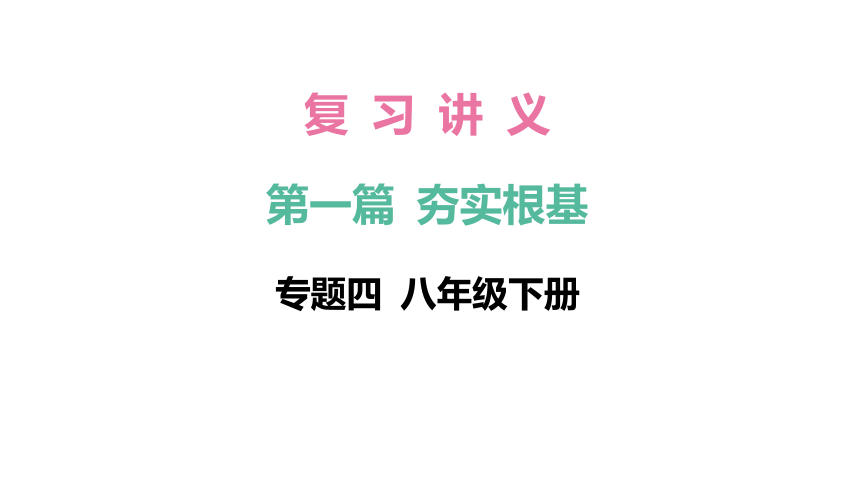
|
|
| 格式 | pptx | ||
| 文件大小 | 396.8KB | ||
| 资源类型 | 教案 | ||
| 版本资源 | 人教新目标(Go for it)版 | ||
| 科目 | 英语 | ||
| 更新时间 | 2025-07-17 12:02:33 | ||
图片预览

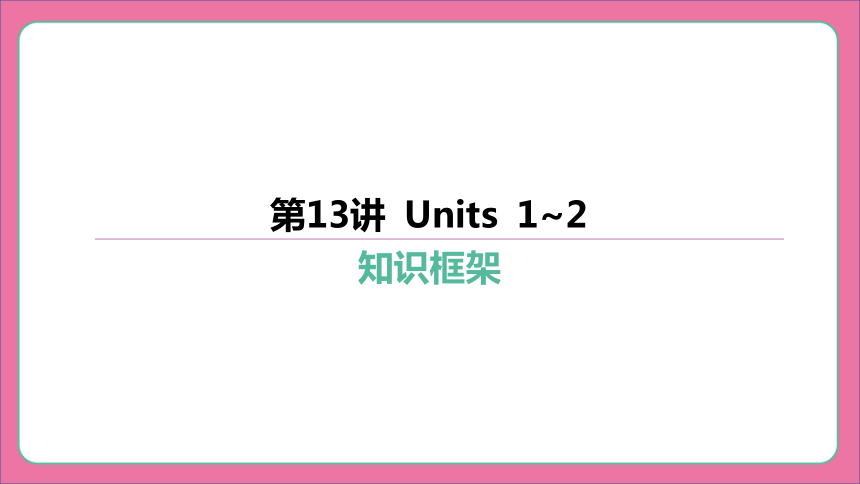
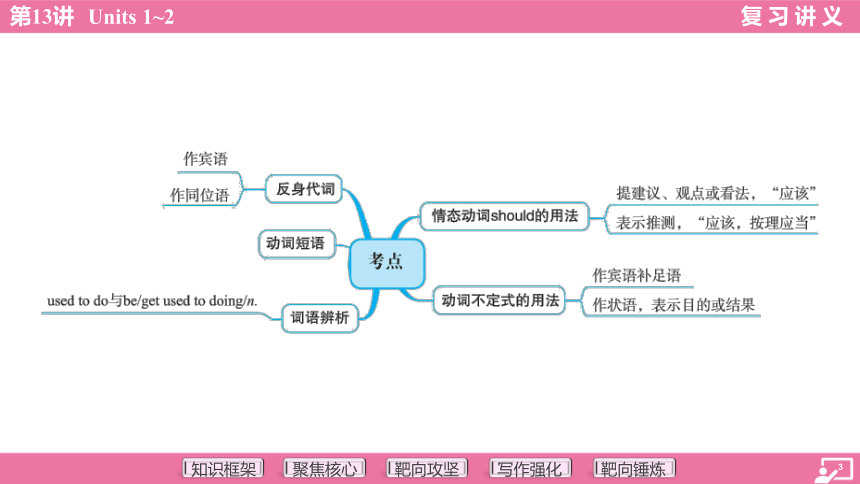
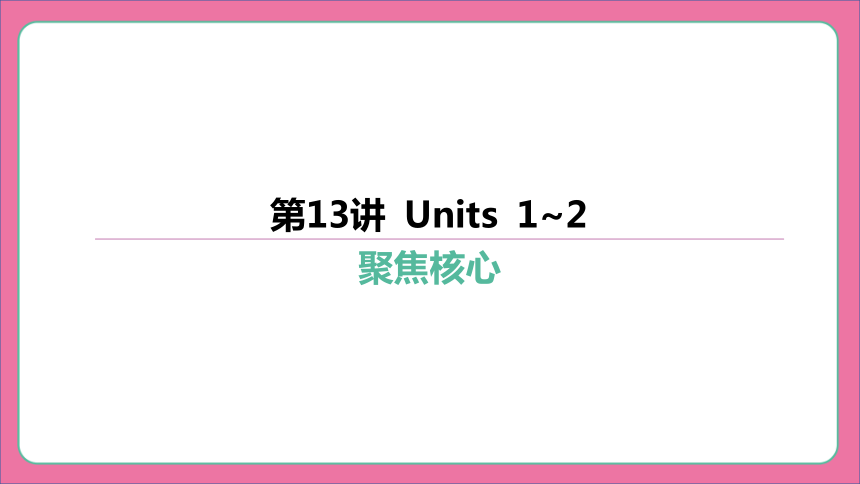
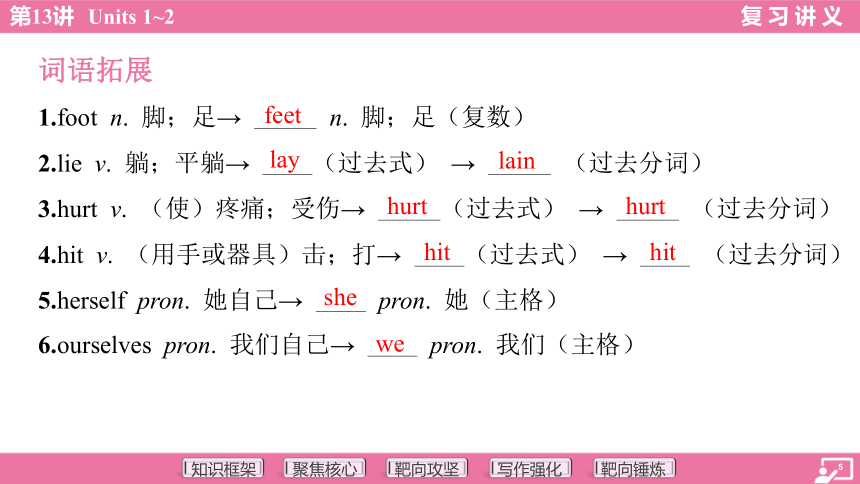
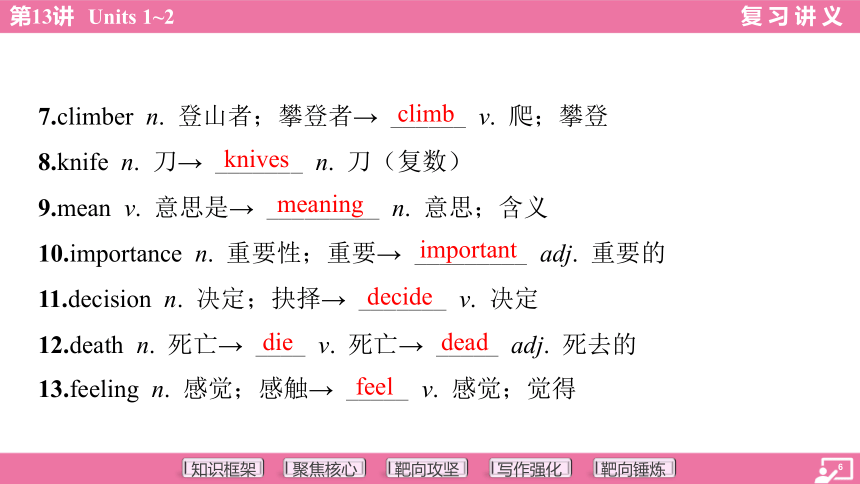
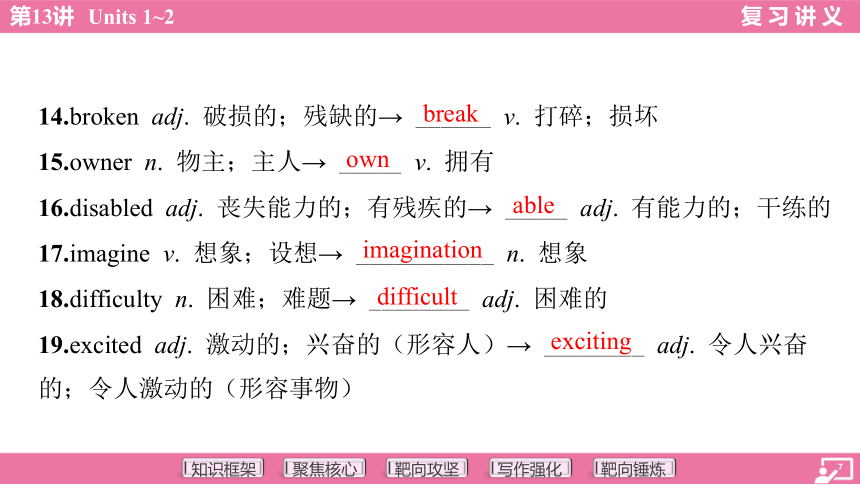
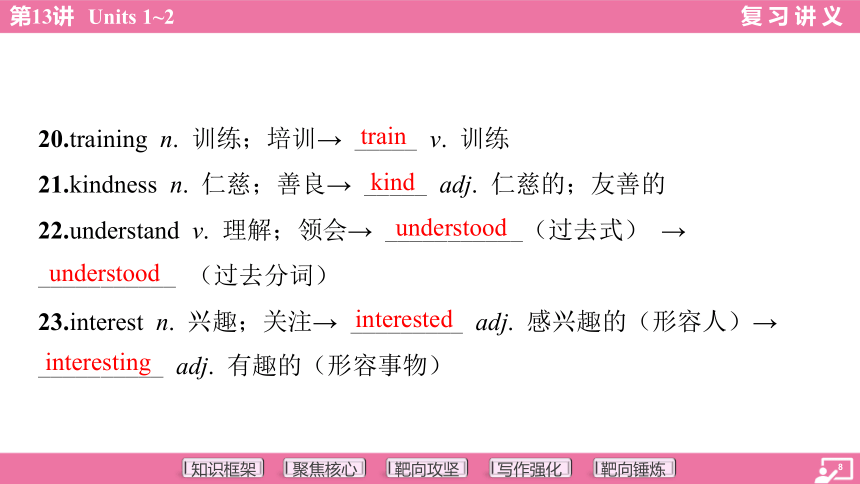
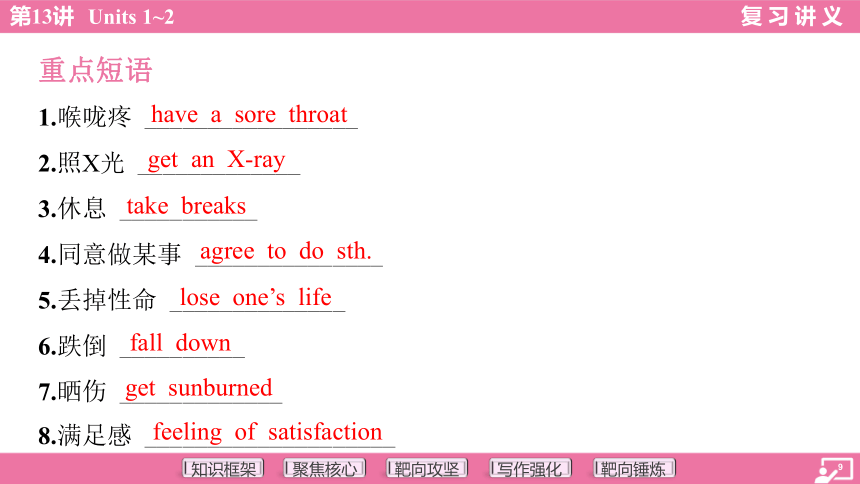
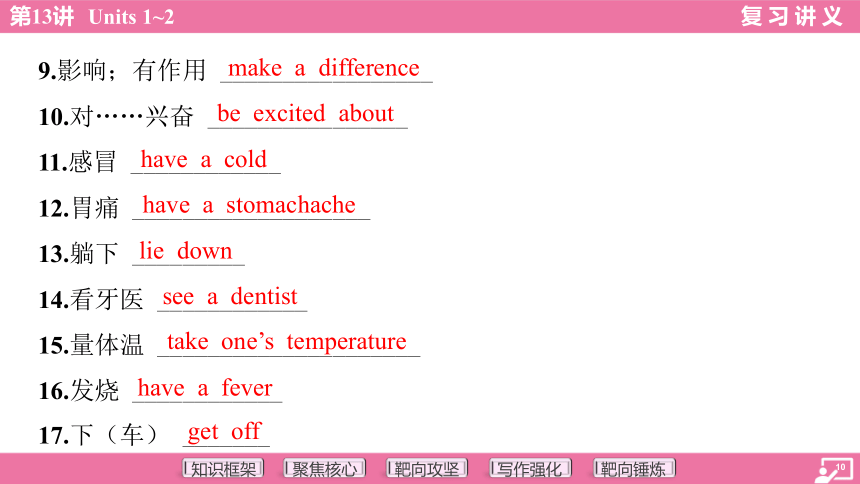
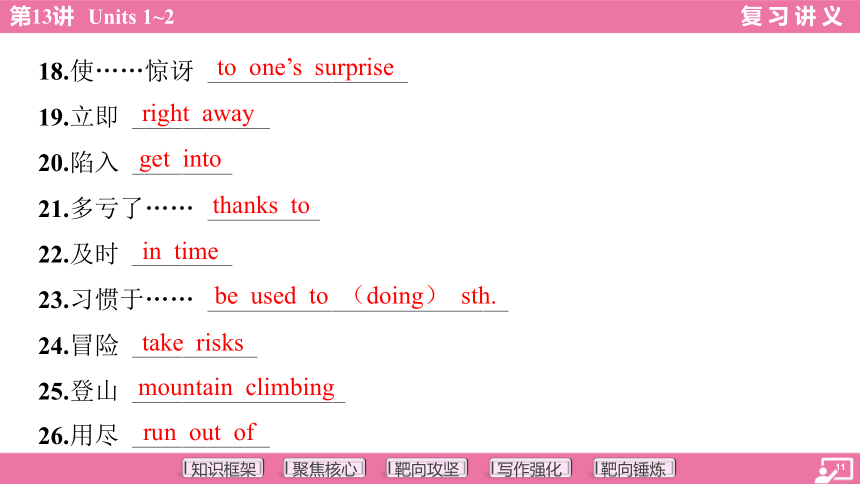
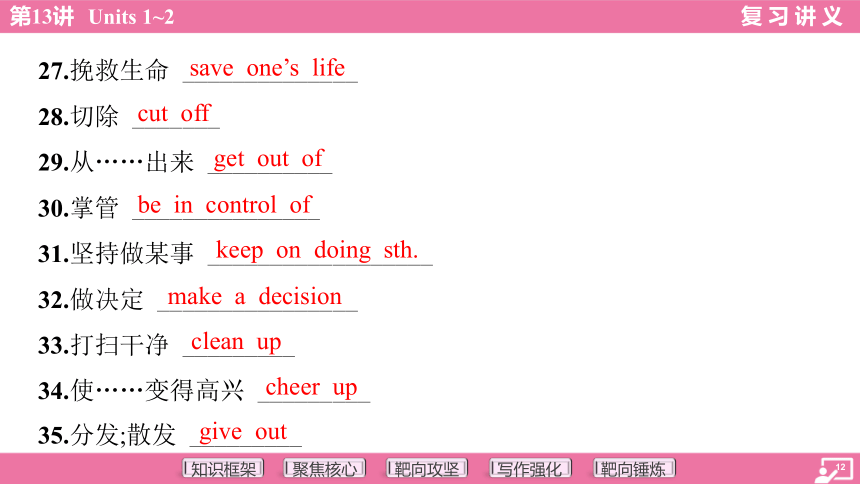
文档简介
(共57张PPT)
复 习 讲 义
第一篇 夯实根基
专题四 八年级下册
第13讲 Units 1~2
知识框架
第13讲 Units 1~2
聚焦核心
词语拓展
1.foot n. 脚;足→ _____ n. 脚;足(复数)
2.lie v. 躺;平躺→ ____(过去式) → _____ (过去分词)
3.hurt v. (使)疼痛;受伤→ _____(过去式) → _____ (过去分词)
4.hit v. (用手或器具)击;打→ ____(过去式) → ____ (过去分词)
5.herself pron. 她自己→ ____ pron. 她(主格)
6.ourselves pron. 我们自己→ ____ pron. 我们(主格)
feet
lay
lain
hurt
hurt
hit
hit
she
we
7.climber n. 登山者;攀登者→ ______ v. 爬;攀登
8.knife n. 刀→ _______ n. 刀(复数)
9.mean v. 意思是→ _________ n. 意思;含义
10.importance n. 重要性;重要→ _________ adj. 重要的
11.decision n. 决定;抉择→ _______ v. 决定
12.death n. 死亡→ ____ v. 死亡→ _____ adj. 死去的
13.feeling n. 感觉;感触→ _____ v. 感觉;觉得
climb
knives
meaning
important
decide
die
dead
feel
14.broken adj. 破损的;残缺的→ ______ v. 打碎;损坏
15.owner n. 物主;主人→ _____ v. 拥有
16.disabled adj. 丧失能力的;有残疾的→ _____ adj. 有能力的;干练的
17.imagine v. 想象;设想→ ___________ n. 想象
18.difficulty n. 困难;难题→ ________ adj. 困难的
19.excited adj. 激动的;兴奋的(形容人)→ ________ adj. 令人兴奋
的;令人激动的(形容事物)
break
own
able
imagination
difficult
exciting
20.training n. 训练;培训→ _____ v. 训练
21.kindness n. 仁慈;善良→ _____ adj. 仁慈的;友善的
22.understand v. 理解;领会→ ___________(过去式) →
___________ (过去分词)
23.interest n. 兴趣;关注→ _________ adj. 感兴趣的(形容人)→
__________ adj. 有趣的(形容事物)
train
kind
understood
understood
interested
interesting
重点短语
1.喉咙疼 _________________
2.照X光 _____________
3.休息 ___________
4.同意做某事 _______________
5.丢掉性命 ______________
6.跌倒 __________
7.晒伤 _____________
8.满足感 ____________________
have a sore throat
get an X-ray
take breaks
agree to do sth.
lose one’s life
fall down
get sunburned
feeling of satisfaction
9.影响;有作用 _________________
10.对……兴奋 ________________
11.感冒 ____________
12.胃痛 ___________________
13.躺下 _________
14.看牙医 ____________
15.量体温 _____________________
16.发烧 ____________
17.下(车) _______
make a difference
be excited about
have a cold
have a stomachache
lie down
see a dentist
take one’s temperature
have a fever
get off
18.使……惊讶 ________________
19.立即 ___________
20.陷入 ________
21.多亏了…… _________
22.及时 ________
23.习惯于…… ________________________
24.冒险 __________
25.登山 _________________
26.用尽 ___________
to one’s surprise
right away
get into
thanks to
in time
be used to (doing) sth.
take risks
mountain climbing
run out of
27.挽救生命 ______________
28.切除 _______
29.从……出来 __________
30.掌管 _______________
31.坚持做某事 __________________
32.做决定 ________________
33.打扫干净 _________
34.使……变得高兴 _________
35.分发;散发 _________
save one’s life
cut off
get out of
be in control of
keep on doing sth.
make a decision
clean up
cheer up
give out
36.想出 ______________
37.推迟 ________
38.分发 _________
39.帮忙做…… _____________
40.过去常常 ________
41.照顾 ________
42.放弃 ________
43.参加……选拔 ________
44.张贴 _______
come up with
put off
hand out
help out with
used to
care for
give up
try out
put up
45.打电话给…… ________
46.停止做某事 ______________
47.修理 _______
48.(外貌或行为)像 __________
49.赠送 __________
50.建立 _______
call up
stop doing sth.
fix up
take after
give away
set up
重点句型
Unit 1
1.—What’s the matter
—I have a sore back.(P1)
——怎么了?
——我背痛。
2.You shouldn’t eat so much next time. (P4)
下次你不要吃那么多。
3.—What’s the matter with Ben
—He hurt himself. (P4)
——本怎么了?
——他伤到了自己。
4.—What should she do
—She should take her temperature. (P4)
——她应该做什么?
——她应该量体温。
Unit 2
5.I hope to work outside. (P9)
我希望到外面工作。
6.Mario believes it can help him get his future dream job. (P11)
马里奥相信这样会帮助他得到未来梦想的工作。
7.I can do what I love to do and help others at the same time.
(P11)
我可以做我喜欢做的事,同时又可以帮助别人。
8.She volunteers there once a week to help kids learn to read.
(P12)
她每周去那里做一次志愿者,帮助孩子们学习如何阅读。
9.I’d like to thank you for giving money to Animal Helpers.
(P14)
我想感谢你捐款给“动物助手”。
10.You help to make it possible for me to have Lucky. (P14)
对我来说,有了你的帮助,我才有可能拥有Lucky。
第13讲 Units 1~2
靶向攻坚
考点1 情态动词should的用法。
情态动词should后接动词原形,变为一般疑问句时将should提前,
变为否定句时在should后加not。should常用于以下两种情况。
1.提出建议、观点或看法。例如:
You look tired. You should lie down and have a rest.你看起来很
累。你应该躺下来休息一下。
2.表示推测,意为“应该,按理应当”。例如:
Wait a minute. I think he should come soon. 等一下。我想他应该
很快就到了。
考点精练
用should的适当形式填空。
1.When you go to a party,you _______ always wear proper clothes.
2.We _________ speak loudly in the reading room.
3.To keep fit, you _______ do more exercise and eat less meat.
4.You _________ shout at him. He is only a 3-year-old boy.
should
shouldn’t
should
shouldn’t
考点2 动词不定式。
动词不定式的基本结构为“to+动词原形”(有时可不加to)。动词不
定式在句中可充当主语、表语、宾语、状语、宾语补足语、定语等。八
年级上册教材已讲过动词不定式作宾语的用法,这里主要讲作宾语补足
语和状语的用法。
1.作宾语补足语。
动词不定式作宾语补足语,放在宾语的后面,表示宾语是什么或怎
么样。
(1)在ask, tell, encourage, get, wish, want, would like, advise,
teach等动词或短语之后,常接带to的不定式作宾语补足语。例如:
Our teacher asks us to come to school on time.老师要求我们按时
到校。
(2)使役动词(have, make, let)及感官动词(feel, hear, watch,
see, notice等)后跟不带to的动词不定式作宾语补足语。例如:
In the past, the boss made his workers work over ten hours a day.
过去,老板让他的工人每天工作十小时以上。
(3)动词help后接不定式作宾语补足语时,不定式符号to可省略,
也可不省略。例如:
On weekends,I often help my mother (to) do some housework.
周末,我经常帮助妈妈做家务。
2.作状语。
(1)表示目的。表示目的时,不定式可以放在句首,也可以放在
句末。放在句首时,不定式和句子之间常用逗号隔开。例如:
To get there on time, we set out at 6:00 in the morning.为了按时
到达那里,我们早上六点就出发了。
(2)表示结果。不定式作结果状语,一般位于句末。例如:
I went to the classroom, to discover it empty. 我来到教室,结果
发现教室空无一人。
考点精练
1.Doctors tell us ________ our hands before every meal.( )
C
A.wash B.washed C.to wash
2.More and more teenagers have poor eyesight (视力), so parents
and teachers should take action________ the situation from getting
worse.( )
B
A.stop B.to stop C.stopped
3.—Look! Kangkang, that old man is crossing the crosswalk.
—Jane, let’s ________ him.( )
A.helps B.to help C.help
C
4.—Why do many farmers put their products online these days
—________ them more easily.( )
A
A.To sell B.Sell C.Selling
5.He felt tired, so he stopped ________ a rest under the tree.( )
C
A.having B.have C.to have
考点3 反身代词。
1.反身代词的单复数形式如下表所示。
数 人称 单 数 复 数
第一人称 myself我自己 ourselves我们自己
第二人称 yourself你自己 yourselves你们自己
第三人称 himself他自己 herself她自己 itself它自己 他们自己
她们自己
它们自己
themselves
2.反身代词的用法。
(1)作宾语。例如:
We enjoyed ourselves at the party last night. 昨晚我们在宴会上玩
得很开心。
(2)作同位语。例如:
The children made model cars themselves. 孩子们自己制作了汽车
模型。
3.反身代词的常用词组。
teach oneself自学
learn by oneself自学
enjoy oneself过得愉快;玩得高兴
help oneself to随便吃/用
come to oneself 苏醒
hurt oneself受伤
by oneself独自
考点精练
itself herself themselves himself yourselves
1.Nobody teaches Mary English. She teaches _______.
2.Something is wrong with my father’s new computer. It always turns
______ off.
3.He had to see the doctor by ________ because his parents weren’t at
home.
4.How delicious! Did the students make the fruit salad all by
___________
5.Boys and girls! Help __________ to some fish.
herself
itself
himself
themselves
yourselves
考点4 动词短语。
动词后加介词或副词等构成短语,表达一种特定的含义。动词短语
主要有以下四种构成形式。
1.动词+介词。如:agree with, ask for, arrive in/at, come from, get
to, get off, hear of, knock at/on, look at, listen to, laugh at, look after,
look for, wait for等。这类动词短语后的宾语无论是名词还是代词,都
要放在介词后。例如:
I’m looking for my key. I’ve been looking for it for an hour. 我
在找我的钥匙。我已经找了一个小时了。
2.动词+副词。如:come out, come over, come in, find out, give
out, grow up, get up, go home, look up, put on, turn on/off, write
down, wake up, work out, put away等。这类动词短语后面的宾语是名
词时,名词可放在副词之前,也可放在副词之后;宾语是代词时,代词
只能放在副词之前。例如:
Please turn on the radio.=Please turn the radio on. 请打开收音机。
Can you pick it up 你能把它捡起来吗?
3.动词+名词+介词。如:have a look at, make friends with, pay
attention to, take care of, look forward to等。在这类动词短语中,宾语
都放在介词之后。例如:
I’m looking forward to going to Beihai again. 我期待着再次去北海。
4.动词+形容词+介词。如:be angry with, be busy with, be
good/bad for, be different from, be late for, be interested in, be famous
for, be good at等。例如:
Hangzhou is famous for the West Lake.杭州因西湖而闻名。
考点精练
1.It’s cold outside. You’d better ________ your coat and scarf.( )
A
A.put on B.put out C.have on
2.Here is the book. First ________ it and then tell me what you think
of it.( )
B
A.look into B.look through C.look up
3.The boy is sleeping. Please ________ the radio.( )
B
A.turn up B.turn down C.turn on
4.—Why do you collect so many old bikes
—I’ll have them ________ and give them away to the children who
don’t have bikes.( )
C
A.used up B.set up C.fixed up
5.If you want to buy this dress, you ’d better ________ first to make
sure it fits you.( )
C
A.pay for it B.take it off C.try it on
考点5 used to do和be/get used to doing/n.的用法区别。
词 语 词 义 区 别 例 句
used to do过去常常做……表示过去常常做某事,现在不做了I used to get up early and take an hour’s walk before breakfast. 我过去常常很早起床并且在早餐前散步一小时。 be/get used to doing/n.习惯于做……用be或get都可以,这里的to是介词,后跟动词-ing形式或名词She isn’t used to living in the countryside now.她现在不习惯在乡下生活。Are you used to the food here 你习惯吃这儿的饭菜吗 考点精练
—How does Jack usually go to work
—He ________ drive a car, but now he ________ there to lose
weight.( )
C
A.used to; is used to walk
B.was used to; is used to walking
C.used to; is used to walking
第13讲 Units 1~2
写作强化
主题:助人为乐
写作强化
赠人玫瑰手有余香。帮助别人自己会感到快乐,得到别人的帮助更
是一种幸运。假设你校正举办以“我身边的好人好事”为主题的英语征文
比赛,请根据以下内容提示,以“An Unforgettable Day”为题,根据下
面的内容提示,用英语写一篇90词左右的记叙文。
内容提示:1.时间;2.地点;3.人物;4.事件;5.感受。
An Unforgettable Day
______________________________________________________________
______________________________________________________________
______________________________________________________________
______________________________________________________________
______________________________________________________________
______________________________________________________________
______________________________________________________________
As the saying goes, “Roses given, fragrance in hand.” In our daily
life, we will meet with a lot of trouble. So it is necessary for us to
help those who are in trouble. Here’s my unforgettable day of helping
others.
My classmate Jason was ill last week. He had to be in hospital,
so I tried my best to help him. Yesterday was Saturday. My classmates
and I went to see him together. We gave him some flowers, because
______________________________________________________________
______________________________________________________________
______________________________________________________________
______________________________________________________________
______________________________________________________________
______________________________________________________________
______________________________________________________________
______________________________________________________________
fresh and beautiful flowers could make him feel good and happy.
What’s more, Jason asked me some questions about study and I
brought him my notebooks. I was patient to answer his questions all
the time. I hope he can be better soon.
I like helping others. Firstly, helping others makes me happy.
Secondly, helping others is also helping myself. All in all, a helpful
person is welcomed everywhere. I will try my best to help others in
the future.
审题谋篇
审主题 一件好人好事
审人称 第一人称、第三人称
审时态 一般过去时
审要点 时间、地点、人物、事件、感受
审结构 开篇:引出话题
中间:具体介绍那天的经历
结尾:表达感受。
常用词句 [词汇]
in trouble,what’s more, all the time
[句型]
①So it is necessary for us to help those who are in
trouble.
②We gave him some flowers, because fresh and beautiful flowers could make him feel good and happy.
续表
第13讲 Units 1~2
靶向锤炼
一、单项选择。
1.Tomas is ________ climber. These days he has ________ bad cold,
so he can’t climb the mountains.( )
A
A.a; a B.a; \\ C.the; a
2.If everybody helps a little, it really makes a difference ________ our
environment.( )
B
A.of B.to C.about
3.Welcome you all to China and enjoy ________ here.( )
B
A.yourself B.yourselves C.themselves
4.To keep children away from danger during the coming summer
holiday, parents ________ give them some safety tips.( )
A
A.should B.may C.could
5.Mr. Smith is used to ________ us some soup before meals.( )
B
A.serve B.serving C.add
6.—Can we walk across the road now
—No, we ________. We have to wait until the light turns
green.( )
B
A.couldn’t B.mustn’t C.shouldn’t
7.Evans had a sore throat. His friend advised him ________ some hot
water.( )
B
A.drinking B.to drink C.drink
8.It’s going to rain tomorrow, so the school will have to ________the
school trip.( )
C
A.turn off B.find out C.put off
9.We ________ make any noise in places such as hospitals and
libraries.( )
B
A.need B.shouldn’t C.should
10.I got up early this morning ________ my grandma at the
airport.( )
A
A.to pick up B.picking up C.picked up
二、用括号内所给单词的正确形式填空。
1.Come on, Sam. Believe in ________(you). You can work out the
problem on your own.
2.Though the little boy is young, he can dress ________ (he)
without anyone’s help.
3.Their house is just like our house, but _____ (we) has a bigger
balcony.
yourself
himself
ours
4.—Why do you buy so many flowers, Justin
—____________ (celebrate) my mother’s birthday.
To celebrate
5.John, at what age did your sister learn ________(write)
6.Doctors often tell us the ___________(important) of exercise.
7.Dale, my bicycle is _______(break). May I use yours tomorrow
morning
8.Our teacher asked us to buy three _______(knife) for the art
lesson.
9.The _______(own) of this red car is a young woman.
10.That bag of rice was not heavy. The boy _______(carry) it by
himself.
to write
importance
broken
knives
owner
carried
三、从方框中选择适当的单词,并用其正确形式填空。每个单
词只能用一次。
well spend either way without
them two teaching child study
For Amanda, volunteering is not only good for community, it’s
also good for her studies. Now she’s 1._________ in the University of
Texas and volunteers at Heart House, a local after-school program for
2.________. This program gives special help to children who are not
doing 3._____ in school.
studying
children
well
Amanda volunteers her time to teach children 4.______ a week.
She has also set up a website for Heart House. In this 5._____ more
people will have an opportunity to learn about Heart House and help
these children.
“I like coaching the kids and helping 6.______ learn how to study.
I also learn a lot from them,” she said.
Because of Amanda’s website, 125 volunteers 7.______ about four
hours a week helping the children at Heart House now. “8.________
Amanda’s website, Heart House would not be able to find enough
twice
way
them
spend
Without
well spend either way without
them two teaching child study
volunteers. She has supported our program a lot,” the program leader
said.
Best of all, Amanda says she won’t stop volunteering after
graduation, 9.______. She hopes to continue 10.________ those who
need help.
either
teaching
well spend either way without
them two teaching child study
四、情景交际。
根据对话内容,从方框中选择恰当的选项补全对话,有一项多余。
A: Tony, you don’t look well. 1.___
B: I didn’t sleep well last night because I had a stomachache.
A: Oh Did you go to Jason’s birthday party last night
B: Yeah. Jason had the party at the Green Restaurant. He invited
twelve friends.
A: 2.___
D
C
well spend either way without
them two teaching child study
B: I ate chicken pizza, a beef sandwich, vegetable salad, and some
chocolate cake.
A: You ate so much! 3.___
B: I also had a lot of ice-creams. You know, I love ice-cream.
A: 4.___ You should try to keep your stomach warm.
B: Oh, I don’t feel well now. My stomach hurts again.
A: 5.___
B: You’re right. But I just don’t want to stand up. I’ll lie down for a
minute.
A
B
F
well spend either way without
them two teaching child study
A. Anything else
B. That’s probably why.
C. What did you eat there
D. What’s the matter with you
E. What happened to you just now
F. You’d better go to the doctor and take some medicine.
复 习 讲 义
第一篇 夯实根基
专题四 八年级下册
第13讲 Units 1~2
知识框架
第13讲 Units 1~2
聚焦核心
词语拓展
1.foot n. 脚;足→ _____ n. 脚;足(复数)
2.lie v. 躺;平躺→ ____(过去式) → _____ (过去分词)
3.hurt v. (使)疼痛;受伤→ _____(过去式) → _____ (过去分词)
4.hit v. (用手或器具)击;打→ ____(过去式) → ____ (过去分词)
5.herself pron. 她自己→ ____ pron. 她(主格)
6.ourselves pron. 我们自己→ ____ pron. 我们(主格)
feet
lay
lain
hurt
hurt
hit
hit
she
we
7.climber n. 登山者;攀登者→ ______ v. 爬;攀登
8.knife n. 刀→ _______ n. 刀(复数)
9.mean v. 意思是→ _________ n. 意思;含义
10.importance n. 重要性;重要→ _________ adj. 重要的
11.decision n. 决定;抉择→ _______ v. 决定
12.death n. 死亡→ ____ v. 死亡→ _____ adj. 死去的
13.feeling n. 感觉;感触→ _____ v. 感觉;觉得
climb
knives
meaning
important
decide
die
dead
feel
14.broken adj. 破损的;残缺的→ ______ v. 打碎;损坏
15.owner n. 物主;主人→ _____ v. 拥有
16.disabled adj. 丧失能力的;有残疾的→ _____ adj. 有能力的;干练的
17.imagine v. 想象;设想→ ___________ n. 想象
18.difficulty n. 困难;难题→ ________ adj. 困难的
19.excited adj. 激动的;兴奋的(形容人)→ ________ adj. 令人兴奋
的;令人激动的(形容事物)
break
own
able
imagination
difficult
exciting
20.training n. 训练;培训→ _____ v. 训练
21.kindness n. 仁慈;善良→ _____ adj. 仁慈的;友善的
22.understand v. 理解;领会→ ___________(过去式) →
___________ (过去分词)
23.interest n. 兴趣;关注→ _________ adj. 感兴趣的(形容人)→
__________ adj. 有趣的(形容事物)
train
kind
understood
understood
interested
interesting
重点短语
1.喉咙疼 _________________
2.照X光 _____________
3.休息 ___________
4.同意做某事 _______________
5.丢掉性命 ______________
6.跌倒 __________
7.晒伤 _____________
8.满足感 ____________________
have a sore throat
get an X-ray
take breaks
agree to do sth.
lose one’s life
fall down
get sunburned
feeling of satisfaction
9.影响;有作用 _________________
10.对……兴奋 ________________
11.感冒 ____________
12.胃痛 ___________________
13.躺下 _________
14.看牙医 ____________
15.量体温 _____________________
16.发烧 ____________
17.下(车) _______
make a difference
be excited about
have a cold
have a stomachache
lie down
see a dentist
take one’s temperature
have a fever
get off
18.使……惊讶 ________________
19.立即 ___________
20.陷入 ________
21.多亏了…… _________
22.及时 ________
23.习惯于…… ________________________
24.冒险 __________
25.登山 _________________
26.用尽 ___________
to one’s surprise
right away
get into
thanks to
in time
be used to (doing) sth.
take risks
mountain climbing
run out of
27.挽救生命 ______________
28.切除 _______
29.从……出来 __________
30.掌管 _______________
31.坚持做某事 __________________
32.做决定 ________________
33.打扫干净 _________
34.使……变得高兴 _________
35.分发;散发 _________
save one’s life
cut off
get out of
be in control of
keep on doing sth.
make a decision
clean up
cheer up
give out
36.想出 ______________
37.推迟 ________
38.分发 _________
39.帮忙做…… _____________
40.过去常常 ________
41.照顾 ________
42.放弃 ________
43.参加……选拔 ________
44.张贴 _______
come up with
put off
hand out
help out with
used to
care for
give up
try out
put up
45.打电话给…… ________
46.停止做某事 ______________
47.修理 _______
48.(外貌或行为)像 __________
49.赠送 __________
50.建立 _______
call up
stop doing sth.
fix up
take after
give away
set up
重点句型
Unit 1
1.—What’s the matter
—I have a sore back.(P1)
——怎么了?
——我背痛。
2.You shouldn’t eat so much next time. (P4)
下次你不要吃那么多。
3.—What’s the matter with Ben
—He hurt himself. (P4)
——本怎么了?
——他伤到了自己。
4.—What should she do
—She should take her temperature. (P4)
——她应该做什么?
——她应该量体温。
Unit 2
5.I hope to work outside. (P9)
我希望到外面工作。
6.Mario believes it can help him get his future dream job. (P11)
马里奥相信这样会帮助他得到未来梦想的工作。
7.I can do what I love to do and help others at the same time.
(P11)
我可以做我喜欢做的事,同时又可以帮助别人。
8.She volunteers there once a week to help kids learn to read.
(P12)
她每周去那里做一次志愿者,帮助孩子们学习如何阅读。
9.I’d like to thank you for giving money to Animal Helpers.
(P14)
我想感谢你捐款给“动物助手”。
10.You help to make it possible for me to have Lucky. (P14)
对我来说,有了你的帮助,我才有可能拥有Lucky。
第13讲 Units 1~2
靶向攻坚
考点1 情态动词should的用法。
情态动词should后接动词原形,变为一般疑问句时将should提前,
变为否定句时在should后加not。should常用于以下两种情况。
1.提出建议、观点或看法。例如:
You look tired. You should lie down and have a rest.你看起来很
累。你应该躺下来休息一下。
2.表示推测,意为“应该,按理应当”。例如:
Wait a minute. I think he should come soon. 等一下。我想他应该
很快就到了。
考点精练
用should的适当形式填空。
1.When you go to a party,you _______ always wear proper clothes.
2.We _________ speak loudly in the reading room.
3.To keep fit, you _______ do more exercise and eat less meat.
4.You _________ shout at him. He is only a 3-year-old boy.
should
shouldn’t
should
shouldn’t
考点2 动词不定式。
动词不定式的基本结构为“to+动词原形”(有时可不加to)。动词不
定式在句中可充当主语、表语、宾语、状语、宾语补足语、定语等。八
年级上册教材已讲过动词不定式作宾语的用法,这里主要讲作宾语补足
语和状语的用法。
1.作宾语补足语。
动词不定式作宾语补足语,放在宾语的后面,表示宾语是什么或怎
么样。
(1)在ask, tell, encourage, get, wish, want, would like, advise,
teach等动词或短语之后,常接带to的不定式作宾语补足语。例如:
Our teacher asks us to come to school on time.老师要求我们按时
到校。
(2)使役动词(have, make, let)及感官动词(feel, hear, watch,
see, notice等)后跟不带to的动词不定式作宾语补足语。例如:
In the past, the boss made his workers work over ten hours a day.
过去,老板让他的工人每天工作十小时以上。
(3)动词help后接不定式作宾语补足语时,不定式符号to可省略,
也可不省略。例如:
On weekends,I often help my mother (to) do some housework.
周末,我经常帮助妈妈做家务。
2.作状语。
(1)表示目的。表示目的时,不定式可以放在句首,也可以放在
句末。放在句首时,不定式和句子之间常用逗号隔开。例如:
To get there on time, we set out at 6:00 in the morning.为了按时
到达那里,我们早上六点就出发了。
(2)表示结果。不定式作结果状语,一般位于句末。例如:
I went to the classroom, to discover it empty. 我来到教室,结果
发现教室空无一人。
考点精练
1.Doctors tell us ________ our hands before every meal.( )
C
A.wash B.washed C.to wash
2.More and more teenagers have poor eyesight (视力), so parents
and teachers should take action________ the situation from getting
worse.( )
B
A.stop B.to stop C.stopped
3.—Look! Kangkang, that old man is crossing the crosswalk.
—Jane, let’s ________ him.( )
A.helps B.to help C.help
C
4.—Why do many farmers put their products online these days
—________ them more easily.( )
A
A.To sell B.Sell C.Selling
5.He felt tired, so he stopped ________ a rest under the tree.( )
C
A.having B.have C.to have
考点3 反身代词。
1.反身代词的单复数形式如下表所示。
数 人称 单 数 复 数
第一人称 myself我自己 ourselves我们自己
第二人称 yourself你自己 yourselves你们自己
第三人称 himself他自己 herself她自己 itself它自己 他们自己
她们自己
它们自己
themselves
2.反身代词的用法。
(1)作宾语。例如:
We enjoyed ourselves at the party last night. 昨晚我们在宴会上玩
得很开心。
(2)作同位语。例如:
The children made model cars themselves. 孩子们自己制作了汽车
模型。
3.反身代词的常用词组。
teach oneself自学
learn by oneself自学
enjoy oneself过得愉快;玩得高兴
help oneself to随便吃/用
come to oneself 苏醒
hurt oneself受伤
by oneself独自
考点精练
itself herself themselves himself yourselves
1.Nobody teaches Mary English. She teaches _______.
2.Something is wrong with my father’s new computer. It always turns
______ off.
3.He had to see the doctor by ________ because his parents weren’t at
home.
4.How delicious! Did the students make the fruit salad all by
___________
5.Boys and girls! Help __________ to some fish.
herself
itself
himself
themselves
yourselves
考点4 动词短语。
动词后加介词或副词等构成短语,表达一种特定的含义。动词短语
主要有以下四种构成形式。
1.动词+介词。如:agree with, ask for, arrive in/at, come from, get
to, get off, hear of, knock at/on, look at, listen to, laugh at, look after,
look for, wait for等。这类动词短语后的宾语无论是名词还是代词,都
要放在介词后。例如:
I’m looking for my key. I’ve been looking for it for an hour. 我
在找我的钥匙。我已经找了一个小时了。
2.动词+副词。如:come out, come over, come in, find out, give
out, grow up, get up, go home, look up, put on, turn on/off, write
down, wake up, work out, put away等。这类动词短语后面的宾语是名
词时,名词可放在副词之前,也可放在副词之后;宾语是代词时,代词
只能放在副词之前。例如:
Please turn on the radio.=Please turn the radio on. 请打开收音机。
Can you pick it up 你能把它捡起来吗?
3.动词+名词+介词。如:have a look at, make friends with, pay
attention to, take care of, look forward to等。在这类动词短语中,宾语
都放在介词之后。例如:
I’m looking forward to going to Beihai again. 我期待着再次去北海。
4.动词+形容词+介词。如:be angry with, be busy with, be
good/bad for, be different from, be late for, be interested in, be famous
for, be good at等。例如:
Hangzhou is famous for the West Lake.杭州因西湖而闻名。
考点精练
1.It’s cold outside. You’d better ________ your coat and scarf.( )
A
A.put on B.put out C.have on
2.Here is the book. First ________ it and then tell me what you think
of it.( )
B
A.look into B.look through C.look up
3.The boy is sleeping. Please ________ the radio.( )
B
A.turn up B.turn down C.turn on
4.—Why do you collect so many old bikes
—I’ll have them ________ and give them away to the children who
don’t have bikes.( )
C
A.used up B.set up C.fixed up
5.If you want to buy this dress, you ’d better ________ first to make
sure it fits you.( )
C
A.pay for it B.take it off C.try it on
考点5 used to do和be/get used to doing/n.的用法区别。
词 语 词 义 区 别 例 句
used to do过去常常做……表示过去常常做某事,现在不做了I used to get up early and take an hour’s walk before breakfast. 我过去常常很早起床并且在早餐前散步一小时。 be/get used to doing/n.习惯于做……用be或get都可以,这里的to是介词,后跟动词-ing形式或名词She isn’t used to living in the countryside now.她现在不习惯在乡下生活。Are you used to the food here 你习惯吃这儿的饭菜吗 考点精练
—How does Jack usually go to work
—He ________ drive a car, but now he ________ there to lose
weight.( )
C
A.used to; is used to walk
B.was used to; is used to walking
C.used to; is used to walking
第13讲 Units 1~2
写作强化
主题:助人为乐
写作强化
赠人玫瑰手有余香。帮助别人自己会感到快乐,得到别人的帮助更
是一种幸运。假设你校正举办以“我身边的好人好事”为主题的英语征文
比赛,请根据以下内容提示,以“An Unforgettable Day”为题,根据下
面的内容提示,用英语写一篇90词左右的记叙文。
内容提示:1.时间;2.地点;3.人物;4.事件;5.感受。
An Unforgettable Day
______________________________________________________________
______________________________________________________________
______________________________________________________________
______________________________________________________________
______________________________________________________________
______________________________________________________________
______________________________________________________________
As the saying goes, “Roses given, fragrance in hand.” In our daily
life, we will meet with a lot of trouble. So it is necessary for us to
help those who are in trouble. Here’s my unforgettable day of helping
others.
My classmate Jason was ill last week. He had to be in hospital,
so I tried my best to help him. Yesterday was Saturday. My classmates
and I went to see him together. We gave him some flowers, because
______________________________________________________________
______________________________________________________________
______________________________________________________________
______________________________________________________________
______________________________________________________________
______________________________________________________________
______________________________________________________________
______________________________________________________________
fresh and beautiful flowers could make him feel good and happy.
What’s more, Jason asked me some questions about study and I
brought him my notebooks. I was patient to answer his questions all
the time. I hope he can be better soon.
I like helping others. Firstly, helping others makes me happy.
Secondly, helping others is also helping myself. All in all, a helpful
person is welcomed everywhere. I will try my best to help others in
the future.
审题谋篇
审主题 一件好人好事
审人称 第一人称、第三人称
审时态 一般过去时
审要点 时间、地点、人物、事件、感受
审结构 开篇:引出话题
中间:具体介绍那天的经历
结尾:表达感受。
常用词句 [词汇]
in trouble,what’s more, all the time
[句型]
①So it is necessary for us to help those who are in
trouble.
②We gave him some flowers, because fresh and beautiful flowers could make him feel good and happy.
续表
第13讲 Units 1~2
靶向锤炼
一、单项选择。
1.Tomas is ________ climber. These days he has ________ bad cold,
so he can’t climb the mountains.( )
A
A.a; a B.a; \\ C.the; a
2.If everybody helps a little, it really makes a difference ________ our
environment.( )
B
A.of B.to C.about
3.Welcome you all to China and enjoy ________ here.( )
B
A.yourself B.yourselves C.themselves
4.To keep children away from danger during the coming summer
holiday, parents ________ give them some safety tips.( )
A
A.should B.may C.could
5.Mr. Smith is used to ________ us some soup before meals.( )
B
A.serve B.serving C.add
6.—Can we walk across the road now
—No, we ________. We have to wait until the light turns
green.( )
B
A.couldn’t B.mustn’t C.shouldn’t
7.Evans had a sore throat. His friend advised him ________ some hot
water.( )
B
A.drinking B.to drink C.drink
8.It’s going to rain tomorrow, so the school will have to ________the
school trip.( )
C
A.turn off B.find out C.put off
9.We ________ make any noise in places such as hospitals and
libraries.( )
B
A.need B.shouldn’t C.should
10.I got up early this morning ________ my grandma at the
airport.( )
A
A.to pick up B.picking up C.picked up
二、用括号内所给单词的正确形式填空。
1.Come on, Sam. Believe in ________(you). You can work out the
problem on your own.
2.Though the little boy is young, he can dress ________ (he)
without anyone’s help.
3.Their house is just like our house, but _____ (we) has a bigger
balcony.
yourself
himself
ours
4.—Why do you buy so many flowers, Justin
—____________ (celebrate) my mother’s birthday.
To celebrate
5.John, at what age did your sister learn ________(write)
6.Doctors often tell us the ___________(important) of exercise.
7.Dale, my bicycle is _______(break). May I use yours tomorrow
morning
8.Our teacher asked us to buy three _______(knife) for the art
lesson.
9.The _______(own) of this red car is a young woman.
10.That bag of rice was not heavy. The boy _______(carry) it by
himself.
to write
importance
broken
knives
owner
carried
三、从方框中选择适当的单词,并用其正确形式填空。每个单
词只能用一次。
well spend either way without
them two teaching child study
For Amanda, volunteering is not only good for community, it’s
also good for her studies. Now she’s 1._________ in the University of
Texas and volunteers at Heart House, a local after-school program for
2.________. This program gives special help to children who are not
doing 3._____ in school.
studying
children
well
Amanda volunteers her time to teach children 4.______ a week.
She has also set up a website for Heart House. In this 5._____ more
people will have an opportunity to learn about Heart House and help
these children.
“I like coaching the kids and helping 6.______ learn how to study.
I also learn a lot from them,” she said.
Because of Amanda’s website, 125 volunteers 7.______ about four
hours a week helping the children at Heart House now. “8.________
Amanda’s website, Heart House would not be able to find enough
twice
way
them
spend
Without
well spend either way without
them two teaching child study
volunteers. She has supported our program a lot,” the program leader
said.
Best of all, Amanda says she won’t stop volunteering after
graduation, 9.______. She hopes to continue 10.________ those who
need help.
either
teaching
well spend either way without
them two teaching child study
四、情景交际。
根据对话内容,从方框中选择恰当的选项补全对话,有一项多余。
A: Tony, you don’t look well. 1.___
B: I didn’t sleep well last night because I had a stomachache.
A: Oh Did you go to Jason’s birthday party last night
B: Yeah. Jason had the party at the Green Restaurant. He invited
twelve friends.
A: 2.___
D
C
well spend either way without
them two teaching child study
B: I ate chicken pizza, a beef sandwich, vegetable salad, and some
chocolate cake.
A: You ate so much! 3.___
B: I also had a lot of ice-creams. You know, I love ice-cream.
A: 4.___ You should try to keep your stomach warm.
B: Oh, I don’t feel well now. My stomach hurts again.
A: 5.___
B: You’re right. But I just don’t want to stand up. I’ll lie down for a
minute.
A
B
F
well spend either way without
them two teaching child study
A. Anything else
B. That’s probably why.
C. What did you eat there
D. What’s the matter with you
E. What happened to you just now
F. You’d better go to the doctor and take some medicine.
